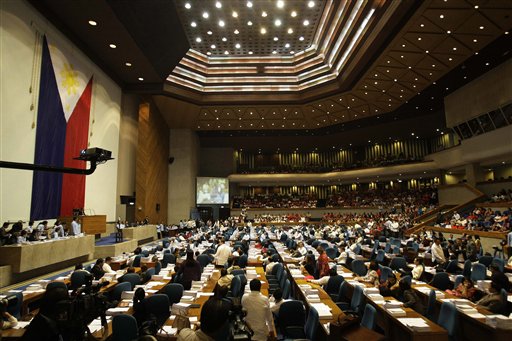
House of Representatives. AP FILE PHOTO
President Duterte is expected to issue a memorandum circular ordering concerned government agencies and requesting Congress to fast-track removal of foreign investment restrictions that require legislation, the country’s chief economist said Thursday.
Socioeconomic Planning Secretary Ernesto M. Pernia told reporters that the upcoming presidential order will complement the moves to liberalize the foreign investment negative list (FINL), which is also pending the President’s approval.
Pernia, who also heads the state planning agency National Economic and Development Authority, said to be removed from the FINL were the eight to 10 sectors, including the following: professions (teaching of foreign professors from foreign universities); public utilities such as telecommunications (except water, sewerage and electricity distribution); and construction, specifically contractors, among others.
Last month, Pernia said mass media and almost every sector except land will be further opened up to foreign equity two years from now through an amendment of the Constitution seen pushing through next year.
Once the government’s plan to liberalize nearly all industries by 2019 happens, foreign direct investment (FDI) inflows could “easily double,” Pernia had said.
The Neda chief had said economic managers were asking the President to certify as urgent the proposed amendments to the economic provisions of the 1987 Constitution, especially as Mr. Duterte had sought Charter change through an appointed constitutional commission (ConCom).
Under the Constitution, no foreign equity is allowed in mass media except recording; the practice of professions, especially law; utilization of marine resources in archipelagic waters, territorial sea and exclusive economic zones as well as small-scale utilization of natural resources in rivers, lakes, bays and lagoons; as well as manufacture, repair, stockpiling and/or distribution of nuclear weapons.
Also under the Constitution, only up to 30-percent foreign equity can be allowed in advertising firms.
Meanwhile, a cap of 40 percent is being applied in foreign-led exploration, development and utilization of natural resources; ownership of private lands; operation of public utilities; educational institutions other than those established by religious groups and mission boards; and facility operator of an infrastructure or a development facility requiring a public utility franchise.
As for land, Pernia had said they were eyeing a 50-year lease contracts to foreigners, renewable by another 50 years.
As for the proposed FINL that was submitted to the Office of the President last month, Pernia had said it had identified a “short” list of areas where foreigners can own up to 49 percent, a list of “sensitive” areas, as well as activities where full foreign ownership will be allowed.
In the case of the contractors in the construction industry, they wanted to allow 100-percent foreign ownership as long as companies have good international reputation, Pernia had said.
As for retail trade, the proposal was to reduce to $200,000 from $2.5 million at present the minimum paid-up capital of foreign retailers looking to establish operations here, according to Pernia.
Neda officials had said they were also eyeing full foreign ownership in investment houses.
Every two years, the government releases the FINL, which lists down sectors where foreign investors have only limited participation.
The 10th FINL was issued by former President Aquino in 2015 under Executive Order No. 184, which had practically kept intact the list of activities and sectors restricted to foreign equity and participation as provided for in the ninth regular FINL.